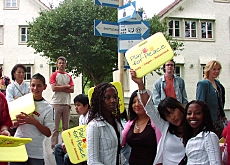Remembering the struggle for peace

Lucerne is holding an international conference to mark the 100th anniversary of the 14th Universal Peace Congress, which took place in the Swiss city in 1905.
Organisers say the meeting aims to remind the public that hundreds of millions of people around the world have to contend with the ravages of war every day.
In the final decades of the 19th century, a number of peace movements arose in Europe.
They represented a wide political spectrum ranging from liberalism to socialism and anarchism.
Pacifists began to make their voices heard through pamphlets, demonstrations and congresses. Their efforts culminated in 1905, when some 400 delegates – mainly from Europe, but also from the United States and China – gathered in Lucerne for the 14th Universal Peace Congress.
Pacifist tradition
A century on, Lucerne is paying homage to this historic event, which attracted international attention at the time.
This Thursday and Friday the city plays host to a conference on the theme of peace and security.
“This is an important part of our heritage,” says Ahmed M. Al Ashker, president of the Lucerne Initiative for Peace and Security (Lips). His association was set up in a bid to facilitate conflict prevention and conflict settlement.
“We thought the congress should be commemorated in a worthy manner, since peace is still the burning issue of our time,” he adds.
Industrialist Jan Bloch led the peace aspirations of some of the citizens of Lucerne in the early years of the 20th century. They founded the world’s first “peace museum” in 1902.
In those days, because of its history of neutrality and democracy, Switzerland became a platform for international pacifist movements, many of which established their headquarters on Swiss soil.
It was no coincidence that three of the first four winners of the Nobel Peace Prize were Swiss citizens: Henri Dunant (1901), Elie Ducommun and Charles Albert Gobat (1902).
Cold War
“Switzerland can certainly be defined as the land of peace: consider the fact that it has not fought a war for more than 150 years, or its policy of neutrality, or the Red Cross,” says El Ashker.
“But perhaps even in Switzerland we take peace rather too much for granted, as if it were the normal state of affairs.”
This week’s conference in Lucerne is intended to remind people that, after more than a century of efforts to establish peace, a large proportion of humanity is still suffering from the consequences of war.
“From the Russian Revolution of 1917 to the fall of the Berlin Wall in 1989, the ideological divide between East and West kept pacifist aspirations on ice,” says Markus Furrer, a professor of history at Fribourg University.
“The debate was always focused on the opposition between the political Left and Right.
“Therefore it was not easy to fight for peace. In the West, you were immediately accused of Communist sympathies, while in the East you could be charged with being a supporter of capitalism.”
Idealists
According to Furrer, pacifism has now in part rediscovered the spirit that characterised its early days.
Nowadays, as in 1905, discussions are no longer dominated by different ideologies.
Rather, pacifism is fuelled by idealism and embraces diverse streams of thought.
“There are still some significant differences of opinion. But a century ago, pacifists were guilty of a great deal of naivety,” says Furrer.
swissinfo, Armando Mombelli
1901: Henri Dunant, founder of the Red Cross, wins the Nobel Peace Prize
1902: Peace Museum opens in Lucerne
1905: 14th Universal Peace Congress takes place in Lucerne
2005: 100th anniversary conference of the 1905 Peace Congress
The International Conference “Visions for Peace and Security: Lucerne 1905-2005” takes place on September 22-23.
The meeting, organised by the Lucerne Initiative for Peace and Security (Lips), is supported by the federal authorities, the canton and city of Lucerne as well as NGOs and private sponsors.

In compliance with the JTI standards
More: SWI swissinfo.ch certified by the Journalism Trust Initiative











You can find an overview of ongoing debates with our journalists here . Please join us!
If you want to start a conversation about a topic raised in this article or want to report factual errors, email us at english@swissinfo.ch.